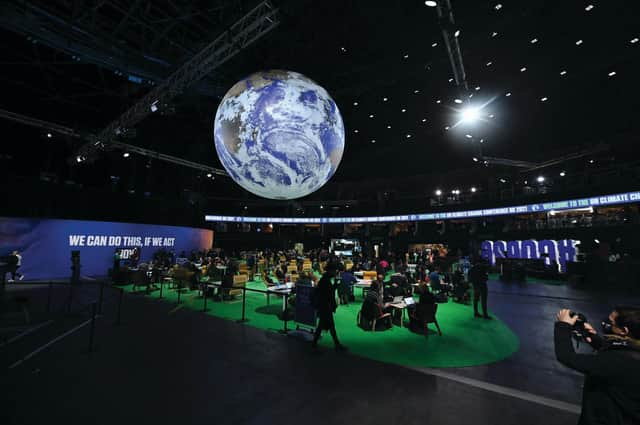Renewables shift in action and conscience the real achievement of COP26


There are more cars and lorries back on the roads of Glasgow this post- COP26 morning. The noise and intensity of rush hour has returned.
Cyclists cast active eyes in all directions. To the side a few electric vehicles remain plugged in at newly-installed charging points by the riverside and SEC, while bigger, battery-powered buses dance between lanes with their diesel cousins.
Pedestrians brave a return to the city centre, pulling up coats against the grey rain. It is 50-50 over mask wearing on the subway, but hand sanitisers stand stoically, sentry-like, at every take-away.
Admittedly, even as light floods through two-thirds of empty office fronts, it feels less colourful without the national dress of visiting climate delegates, banners of protest or lines of police officers.
Media outlets seem undecided between the merits of covering domestic politics or the assertion from the UK Government that the UN Climate Change Summit has been “an historic achievement”.
The end of coal as an energy source is nigh. If Old King Coal is phased into history, eyes will sooner or later turn increasingly to other fossil fuels, notably oil and gas, and their sibling hydrogens, or carbon capture.
Today though seems normal. As diversion signs are removed and city streets return to normal, while Scotland’s national football teams eye World Cup play-offs and thoughts turn to Christmas versus lockdowns, some might wonder what all the fuss was about.
Why it took 40,000 people from almost 200 nations, prime ministers and presidents to come here and debate a deal that aims to keep warming “well below” 2C, with a push to limit any rise to 1.5C by the end of next year. What spurred 10,000 children one day and 150,000 marchers the next to take to the streets to demand action?
But you’ve just read many of the reasons. How we travel, commute, work, educate, debate, protest, plan and come together have been influenced by COP26 and what went before. The age of the renewable society is upon us.
It impacts on the decisions made at both Scottish and UK Government levels, which ultimately filter down to our everyday lives as we embrace the tools at hand.
Smart meters, for example, are part of an upgrade to Britain’s energy system that will help it reduce the use of fossil fuels and increase the use of renewables. They are now in around 25 million GB homes and businesses.
The devices come with a handy in-home display which shows usage in pounds and pence in near-real time and helps you to identify energy waste, which can help you to lower your usage and therefore your costs.
Smart meters are also helping to build the flexible, modern energy system we need to fully integrate our changeable renewable energy sources. A system that could help us better plan the energy we need nationally, and that can pinpoint where faults are occurring more quickly. A system that will, in conjunction with smart meters, help consumers to take action to lessen their carbon footprint.
Switching to an electric car, for example, looks likely for many as experts predict they will cost the same as traditional cars within five years, after agreement to ban petrol and diesel vehicles by 2035.
With more than 40 nations signing up to phase down coal, a similar number including the UK have committed to ensuring clean energy is the most reliable and affordable option for homes and businesses.
That might see heat pumps and solar panels among the things to become standard in our homes as part of a smart energy network. Close to 500 financial institutions have pledged more money for clean tech to help make such things happen.
Ultimately, a more secure, flexible and greener energy system, underpinned by smart meters, is part of our smarter, cleaner future.
UK Prime Minister Boris Johnson said in the hours after COP26 ended that it had armed nations with the tools they need to transition. But he also spoke of the influence of individual choice. How we, the consumer, can effect change by our own actions.
Johnson said: “People ask me am I more optimistic now, yes I am much more optimistic. Because I genuinely think this thing is now propelled by a force that is bigger than corporations and is bigger than governments, and that is people and consumer choice and what citizens want around the world.”
Perhaps after COP26 the biggest impact is a new realisation that the power of change may lie with the individual actions of people themselves.
Join the energy revolution. Search: “Get a smart meter”.